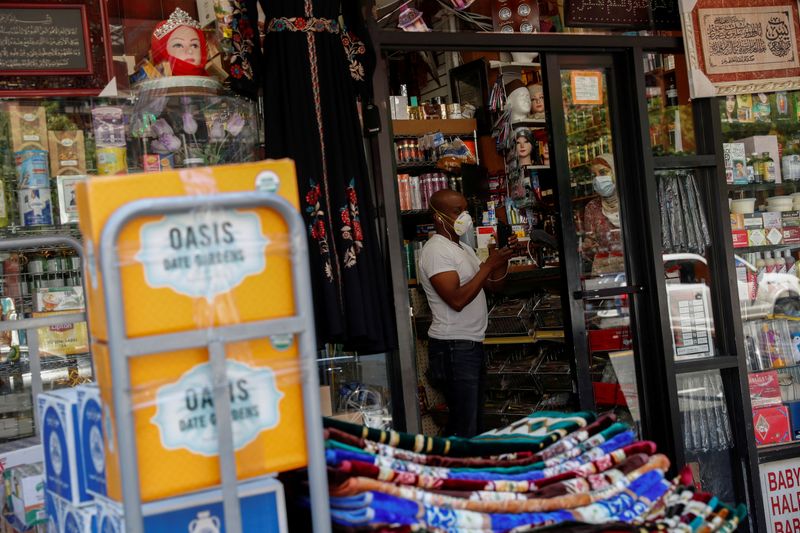By Lucia Mutikani
WASHINGTON (Reuters) - U.S. consumer confidence rebounded in June as businesses reopened, strengthening views that the economic downturn was likely over, though rising COVID-19 infections threaten to derail the budding recovery.
The survey from the Conference Board on Tuesday followed a sharp surge in hiring and consumer spending in May. The housing market and manufacturing have also improved.
Federal Reserve Chair Jerome Powell on Monday acknowledged the rebound in activity, saying the economy had "entered an important new phase and (had) done so sooner than expected."
In remarks prepared for a congressional hearing on Tuesday, the U.S. central bank chief cautioned that the economic outlook "is extraordinarily uncertain" and would depend on "our success in containing the virus."
The economy slipped into recession in February. Businesses have largely reopened after being shuttered in mid-March to slow the spread of the coronavirus. Large parts of the country, including densely populated California, Texas and Florida have reported a surge in cases of the respiratory illness. Some states are scaling back or pausing business reopenings.
"The long road to normalcy is miles and miles away and the journey is a hazardous one as already a second wave of the pandemic virus has made some states backtrack on their reopening plans," said Chris Rupkey, chief economist at MUFG in New York.
The Conference Board said its consumer confidence index rose to a reading of 98.1 this month from 85.9 in May. Still, the confidence index remains 34.5 points below its pre-pandemic level.
Economists polled by Reuters had forecast the index rising to 91.8 in June.
The survey's present situation measure, based on consumers' assessment of current business and labor market conditions, increased to a reading of 86.2 this month from 68.4 in May.
The expectations index based on consumers' short-term outlook for income, business and labor market conditions jumped to 106.0 from a reading of 97.6 in May.
Stocks on Wall Street were trading higher on the confidence data. The dollar was lower against a basket of currencies. U.S. Treasury prices were marginally lower.
LABOR MARKET SENTIMENT IMPROVES
The Conference Board's so-called labor market differential, derived from data on respondents' views on whether jobs are plentiful or hard to get, improved to a reading of -3 this month from -12.7 in May. That measure closely correlates to the unemployment rate in the Labor Department's employment report.
It has dropped from as high as 38.3 in August last year.
The pandemic has unleashed record unemployment, with 30.6 million people collecting unemployment checks in the first week of June. The closely followed employment report to be released on Thursday is expected to show 3 million jobs created in June on top of the 2.5 million added in May, according to a Reuters survey of economists.
That would still leave payrolls nearly 17 million below their pre-COVID-19 level. The jobless rate is forecast dipping to 12.3% from 13.3% in May.
The Conference Board survey showed the percentage of consumers expecting an increase in income in the short term climbed to 15.1% this month from 14.6% in May and the proportion anticipating a drop fell to 14.4% from 15.4%.
Manufacturing is also stabilizing with a separate report on Tuesday showing a steady pick-up in factory activity in the Midwest. The MNI Indicators' Chicago Business Barometer rose to a reading of 36.6 in June from 32.3 in May.
Activity in the second quarter, however, slipped 11.8 points to 34.8, the lowest level since Q1 2009.
"The data are signaling a much slower pace of contraction in manufacturing," said Rubeela Farooqi, chief U.S. economist at High Frequency Economics in White Plains, New York. "However, new flare-ups in virus cases across states, if they are not contained, pose a downside risk to both activity and output."

A third report showed the S&P CoreLogic Case-Shiller 20-metro-area house price index increased 4.0% from a year ago in April after rising 3.9% in March.
